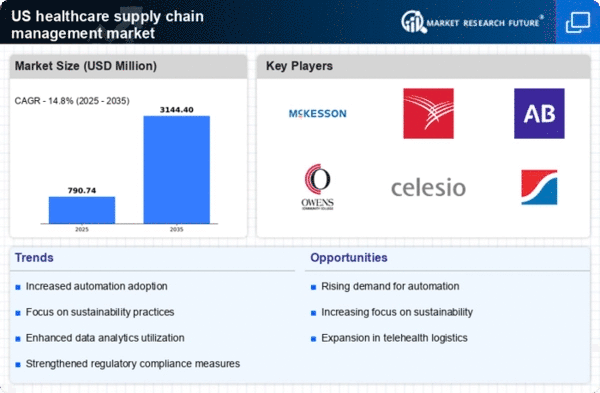Increased Focus on Data Analytics
The increased focus on data analytics is reshaping the healthcare supply-chain-management market. As organizations collect vast amounts of data, the ability to analyze and leverage this information is becoming crucial for decision-making. In 2025, it is anticipated that data analytics will account for approximately 18% of supply-chain investments. By utilizing data analytics, healthcare providers can gain insights into inventory trends, patient demand, and supplier performance. This information enables more informed decisions, ultimately leading to improved operational efficiency and reduced waste. The growing emphasis on data-driven strategies is likely to enhance the overall effectiveness of supply-chain management, positioning organizations to better respond to the dynamic needs of the healthcare environment.
Focus on Cost Reduction Strategies
Cost reduction strategies are becoming increasingly vital in the healthcare supply-chain-management market. With rising operational costs, healthcare providers are under pressure to find ways to enhance efficiency while maintaining quality care. In 2025, it is projected that organizations will allocate around 20% of their supply-chain budgets towards initiatives aimed at cost reduction. This includes optimizing procurement processes, renegotiating supplier contracts, and implementing lean inventory practices. By focusing on cost efficiency, healthcare providers can redirect resources towards patient care and innovation. The emphasis on cost reduction is likely to drive competition among suppliers, leading to more favorable pricing and improved service levels in the healthcare supply-chain-management market.
Regulatory Compliance and Standards
Regulatory compliance remains a critical driver in the healthcare supply-chain-management market. The healthcare sector is subject to stringent regulations aimed at ensuring patient safety and product quality. Compliance with these regulations often necessitates the implementation of robust supply-chain processes. In 2025, it is estimated that compliance-related expenditures will constitute around 15% of total supply-chain costs for healthcare organizations. This includes investments in tracking systems, quality assurance protocols, and training programs for staff. As regulations evolve, healthcare providers must adapt their supply-chain strategies to maintain compliance, which can lead to increased operational efficiency and reduced risk of penalties. Thus, the focus on regulatory adherence is likely to shape the future landscape of the healthcare supply-chain-management market.
Rising Demand for Efficient Logistics
The healthcare supply-chain-management market is experiencing a notable increase in demand for efficient logistics solutions. As healthcare providers strive to enhance patient care, the need for timely and accurate delivery of medical supplies and equipment has become paramount. In 2025, the logistics segment is projected to account for approximately 30% of the overall market share. This demand is driven by the necessity to minimize delays and reduce operational costs, which can significantly impact patient outcomes. Furthermore, advancements in logistics technology, such as real-time tracking and automated inventory management, are likely to play a crucial role in optimizing supply chains. Consequently, organizations are investing in innovative logistics strategies to ensure that healthcare facilities are well-stocked and prepared to meet patient needs.
Technological Advancements in Supply Chain
Technological advancements are significantly influencing the healthcare supply-chain-management market. The integration of technologies such as artificial intelligence (AI), machine learning, and blockchain is transforming traditional supply-chain processes. These technologies enhance visibility, improve forecasting accuracy, and streamline operations. For instance, AI-driven analytics can optimize inventory levels, potentially reducing excess stock by up to 20%. In 2025, the market for technology solutions in supply-chain management is expected to grow by approximately 25%, reflecting the increasing reliance on digital tools. As healthcare organizations seek to improve efficiency and reduce costs, the adoption of these technologies is likely to accelerate, thereby reshaping the competitive landscape of the healthcare supply-chain-management market.
























Leave a Comment